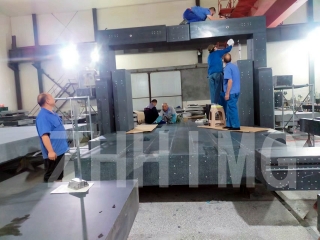Granite is a commonly used material in the construction industry due to its strength, durability, and aesthetic appeal. However, its unique properties make it an ideal choice for use in semiconductor equipment as well. In this article, we will explore the unique application advantages of granite in semiconductor equipment.
1. Thermal Stability
One of the most significant advantages of using granite in semiconductor equipment is its excellent thermal stability. Granite is a natural insulator and has a low coefficient of thermal expansion. This makes it ideal for use in high-temperature applications where stability is critical. For instance, granite is used in the manufacture of wafer chucks, which are the critical component in holding silicon wafers during the manufacturing process. The wafer chucks require excellent thermal stability to maintain the desired temperature during the manufacturing process without shifting or deforming.
2. High Precision and High Accuracy
Another advantage of granite in semiconductor equipment is its high precision and accuracy. Granite has a naturally flat surface and high dimensional stability, making it ideal for use in precision machining applications. It is the perfect material for creating precise molds and dies used in the manufacturing of semiconductor components. Granite's non-porous, low-maintenance surface also ensures long-term accuracy with minimal wear and tear.
3. Vibration Damping
In semiconductor manufacturing equipment, vibration can cause unwanted interference and adversely affect the process. Fortunately, granite has excellent vibration-damping properties. It is a dense, rigid material that is highly resistant to vibration and noise. It helps to reduce noise, vibration, and other environmental disturbance in semiconductor manufacturing equipment.
4. Resistance to Chemicals and Corrosion
Additionally, granite is resistant to many chemicals and corrosion, making it ideal for use in harsh environments. In semiconductor manufacturing, the demanding chemical processes often require high resistance to acidic and caustic materials. Granite resists etching, staining, and deterioration from exposure to commonly used semiconductor chemicals like hydrofluoric acid and ammonium hydroxide.
5. Reduced Maintenance Costs
Granite's durability and resistance to wear and tear minimize maintenance costs in semiconductor manufacturing facilities. This is especially important since semiconductor manufacturing equipment requires high levels of precision and accuracy that can be compromised by wear and tear. The inherent properties of granite reduce the frequency of maintenance, thereby saving time and money.
Conclusion
In summary, there are many unique application advantages of granite in semiconductor equipment, including thermal stability, high precision and accuracy, vibration damping, resistance to chemicals and corrosion, and reduced maintenance costs. With these advantages, it is no wonder why granite has become an essential material in the semiconductor industry. Companies that invest in granite-based semiconductor equipment are sure to enjoy accuracy, quality, and efficiency in their operations.
Post time: Mar-19-2024

